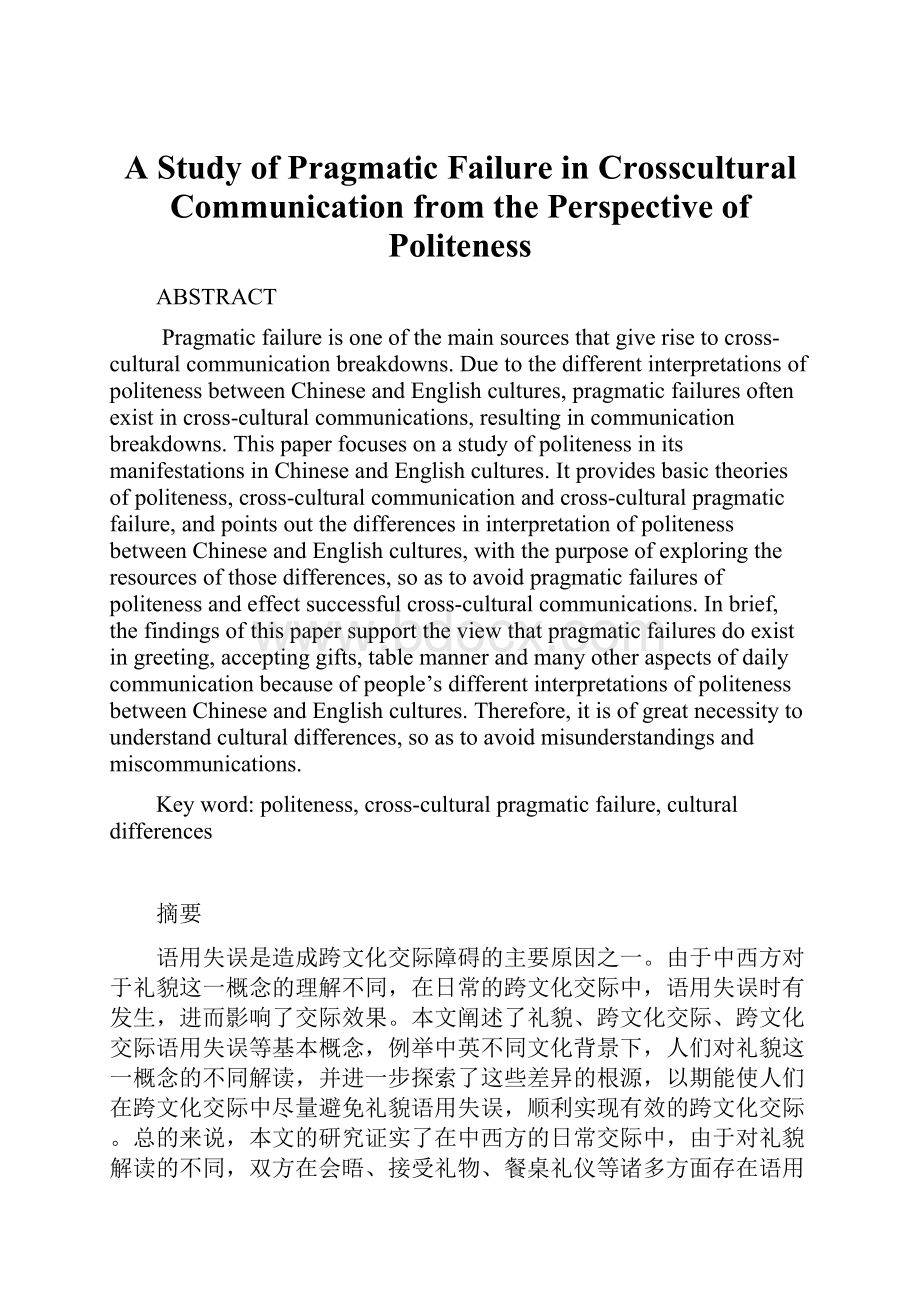A Study of Pragmatic Failure in Crosscultural Communication from the Perspective of Politeness.docx
《A Study of Pragmatic Failure in Crosscultural Communication from the Perspective of Politeness.docx》由会员分享,可在线阅读,更多相关《A Study of Pragmatic Failure in Crosscultural Communication from the Perspective of Politeness.docx(15页珍藏版)》请在冰豆网上搜索。

AStudyofPragmaticFailureinCrossculturalCommunicationfromthePerspectiveofPoliteness
ABSTRACT
Pragmaticfailureisoneofthemainsourcesthatgiverisetocross-culturalcommunicationbreakdowns.DuetothedifferentinterpretationsofpolitenessbetweenChineseandEnglishcultures,pragmaticfailuresoftenexistincross-culturalcommunications,resultingincommunicationbreakdowns.ThispaperfocusesonastudyofpolitenessinitsmanifestationsinChineseandEnglishcultures.Itprovidesbasictheoriesofpoliteness,cross-culturalcommunicationandcross-culturalpragmaticfailure,andpointsoutthedifferencesininterpretationofpolitenessbetweenChineseandEnglishcultures,withthepurposeofexploringtheresourcesofthosedifferences,soastoavoidpragmaticfailuresofpolitenessandeffectsuccessfulcross-culturalcommunications.Inbrief,thefindingsofthispapersupporttheviewthatpragmaticfailuresdoexistingreeting,acceptinggifts,tablemannerandmanyotheraspectsofdailycommunicationbecauseofpeople’sdifferentinterpretationsofpolitenessbetweenChineseandEnglishcultures.Therefore,itisofgreatnecessitytounderstandculturaldifferences,soastoavoidmisunderstandingsandmiscommunications.
Keyword:
politeness,cross-culturalpragmaticfailure,culturaldifferences
摘要
语用失误是造成跨文化交际障碍的主要原因之一。
由于中西方对于礼貌这一概念的理解不同,在日常的跨文化交际中,语用失误时有发生,进而影响了交际效果。
本文阐述了礼貌、跨文化交际、跨文化交际语用失误等基本概念,例举中英不同文化背景下,人们对礼貌这一概念的不同解读,并进一步探索了这些差异的根源,以期能使人们在跨文化交际中尽量避免礼貌语用失误,顺利实现有效的跨文化交际。
总的来说,本文的研究证实了在中西方的日常交际中,由于对礼貌解读的不同,双方在会晤、接受礼物、餐桌礼仪等诸多方面存在语用失误现象,因此,人们有必要了解认识文化间的差异,有效地避免跨文化交际中的误解或障碍。
关键词:
礼貌;跨文化交际语用失误;文化差异
Content
AbstractinEnglish
AbstractinChinese
1.Introduction
2.LiteratureReview
2.1StudiesonPolitenessatHomeandAbroad
2.1.1StudiesonPolitenessAbroad
2.1.2StudiesonPolitenessinChina
2.2StudiesonPragmaticFailureatHomeandAbroad
2.2.1StudiesonPragmaticFailuresAbroad
2.2.2StudiesonPragmaticFailuresinChina
2.2.3CausesofCross-culturalPragmaticFailureinPoliteness
3.DifferentAspectsofPragmaticFailurefromthePerspectiveofPoliteness
3.1Greetings
3.2SenseofSpaceandPhysicalContact
3.3AttitudesTowardstheOld
3.4TableMannerandAcceptingGifts
4.Conclusion
References
1.Introduction
Politenessasasocialphenomenoncanbeobservedinalllanguagesandcultures,andithaslongbeenmadeanimportantobjectofstudyinlinguistics.ThestudyofpolitenessintheWesternlinguisticcirclescanbetracedbacktotheGermanRomanticMovementintheearly1920s.Inrecentyears,alongwiththerapidmovementtowardspragmatics,politenesshasbecomethecentraltheme.Asacommonsocialphenomenon,politenessisnotonlyauniversallyhighlyvaluedvirtue,butalsoawidelyemployedstrategytorealizetactfulandeffectivecommunication.Despiteitsuniversalityofpoliteness,thewaystorealizepolitenessandthestandardsofjudgmentdifferindifferentcultures.Beingunawareofsuchdifferenceswouldprobablyleadtotroublesorfailuresincross-culturalcommunications.
AccordingtoThomas(1983),pragmaticfailure,whichcanbedividedintopragmalinguisitcfailureandsociopragmaticfailure,referstotheinabilitytounderstandwhatismeantbywhatissaid.AsChinesecultureisnotthesameasthatoftheEnglish-speakingcountries,therulesforusingChineseare,insomerespects,differentfromthoseforusingEnglish.Therefore,itisdifficultforChineselearnerstoselectalinguisticformthatisappropriateforaspecificsituation,ortouseEnglishappropriatelyinsocialinteractions.Inotherwords,pragmaticfailureoftenoccurswhenChineselearnerscommunicatewithEnglishnativespeakers.
Pragmaticfailuresinpoliteutterancesareunavoidable.Communicationsbetweennativespeakersandnon-nativespeakersencounterallkindsofviolationofpoliteprinciples.Failuresinpolitenessaremostreflectedinthespeechactstodisplaytheintendedmeaningsandtoconveytheexpectedideas.So,themainissuetobediscussedinthisthesisisnarroweddowntothespecificpragmaticfailuresinpolitespeechacts,andcausesanalysisisconductedfromthecognitivepointofview.
2.LiteratureReview
2.1StudiesonPolitenessStudiesatHomeandAbroad
2.1.1StudiesonPolitenessAbroad
Politenessisauniversalphenomenoninhumansociety.Differentlinguistsandscholarsgivetheirdifferentinterpretationsofpoliteness.Politespeechacts,functionally,istoavoidfailureormisunderstandingincommunications,inordertoachievethepurposeofthespeakerortheexpectedresult.ItisjustconsideringthispointthatlinguistGriceadvocateshisfamousfourconversationalmaximsandtheCooperativePrinciple(CP)torevealthewaysorthemechanismsbywhichpeopleinterpretimplicaturetoaccomplishtheirconversations.Histheoryhasbeenseenaspragmaticprinciplesinconversationsforinterpersonalcommunications,buttoalargeextentandfromthepointoffunctions,itcanalsobeviewedasastudyonpoliteness.GricehasformulatedtheconversationalmaximsofQuantity,Quality,RelationandMannerrespectively,knownasCPbyGricePaul(Grice,1975).
BesidestheCPsoughtbyGrice,LeechhasdoneadetailedstudyonthePolitenessPrinciples(identifiedasPP),whoformulatedsixpolitenessmaximsastactmaxim,generositymaxim,approbationmaxim,modestymaxim,agreementmaxim,andsympathymaxim(Leech,1983).Thepolitenessprincipleisaseriesofmaxims,whichGeoffLeechhasproposedasawayofexplaininghowpolitenessoperatesinconversationalexchanges.Leechdefinespolitenessasformsofbehaviorthatestablishandmaintaincomity.Thatistheabilityofparticipantsinasocialinteractiontoengageininteractioninanatmosphereofrelativeharmony.InstatinghismaximsLeechuseshisowntermsfortwokindsofillocutionaryacts.Hecallsrepresentatives“assertives”,andcallsdirectives“impositives”.Leechlooksonpolitenessasacrucialinaccountingfor“whypeopleareoftensoindirectinconveyingwhattheymean.”(Leech,1983)HethusputsforwardthePolitenessPrinciplesoasto“rescuetheCooperativePrinciple”inthesensethatpolitenesscansatisfactoryexplainexceptionstoandapparentderivationfromtheCP.Therefore,hispolitenessPrincipleisnotjustanadditiontoGrice’sCP,butanecessarycomplementneededforcaseswheretheCPfailstoofferareasonableexplanation.
Leech’s(1983)maximsofthePolitenessPrincipletendtogoinpairsasfollows:
A.Tactmaxim
Minimizetheexpressionofbeliefswhichimplycosttoother,maximizetheexpressionofbeliefswhichimplybenefittoother
B.TheGenerositymaxim
Minimizetheexpressionofbenefittoself;Maximizetheexpressionofcosttoself.
C.TheApprobationmaxim
Minimizetheexpressionofbeliefswhichexpressdispraiseofother;Maximizetheexpressionofbeliefswhichexpressapprovalofother.Othermaynotbethepersondirectlyaddressed,butsomeoneorsomethingdeartohumorher.
D.TheModestymaxim
Minimizetheexpressionofpraiseofself;Maximizetheexpressionofdispraiseofself.
E.TheAgreementmaxim
Minimizetheexpressionofdisagreementbetweenselfandother;Maximizetheexpressionofagreementbetweenselfandother.
F.TheSympathymaxim
Minimizetheexpressionofdetestofother;Maximizetheexpressionofsympathyofother.IwillmakeacomparisoninpolitenessprinciplebetweenChinaandEnglish-speakingcountriesaccordingtothesemaxims.
PolitestrategiesproposedbyBrownandLevinson(Leech,1983)giveanewdimensiontothepolitenessstudyspace.Histheoriesofpolitenessstrategiesarebald-onrecord,positivepoliteness,negativepolitenessandoff-record,amongwhichpositiveandnegativepolitenessarecentraltopoliteness.
2.1.2StudiesonPolitenessinChina
InChina,therealstudyofpolitenessonlybeganinthe1980swhenpragmaticswasintroducedintoChina.InmodernChinese,theequivalentofpoliteness,limao,isbelievedtohaveevolvedinhistoryfromthenotionofli.ThenotionoflioriginatedwiththeancientChinesephilosopherandthinkerConfucius(B.C.551-479),wholivedatatimewhentheslaverysystemhaddisintegratedandtherewereconstantwarsbetweenfeudalstates;theformeraristocraticsocialhierarchywasshatteredandchaosreignedovertheland.Toremedythesituation,Confuciusadvocatedtherestorationof“li”,whichreferredtothesocialhierarchyandorderoftheslavesocietyoftheZhouDynasty(datingbackto1100B.C.)ToConfucius,itwasthemodelofanidealsociety.Torestore“li”,itwasnecessarytozhengming(torectifynames),i.e.toputeachindividualinhisplaceaccordingtohissocialposition.Confuciussetmuchstorebyzhengmingbecausehethought,ifnamesarenotproperlyrectified,speechcannotbeusedappropriately,nothingcanbeachieved;ifnothingisachieved,“li”cannotberestored.…andconsequentlysocialorderandhierarchycannotbemaintained.
Thenotionof“li”advocatedbyConfuciuswasinterpreted,associalappropriacy(sic)withregardtoone’ssocialstatus,bywayofself-denigratingandother-respecting.IthaseversincebecomeanessentialfeatureoftheChinesenotionofpolitenessandhasremainedatthecoreofpolitenessintheChineseculture.(He,1995)
Confuciussetup81lethicalmoralsystemintendedideallygovernsal1relationshipsinthefamilyandnation.Hetaughtthatsocietywasmadeupoffiverelationships:
thosebetweenrulerandsubjects,husbandandwife,fatherandsonelderbrotherandyoungerbrotherandfriends.Heemphasizesvirtue,se1f1essness,duty,patriotism,hardworkandrespectforhierarchy.Hegivessocialrelationshipstoliveinharmonywiththeuniverse,withyourfollowsm